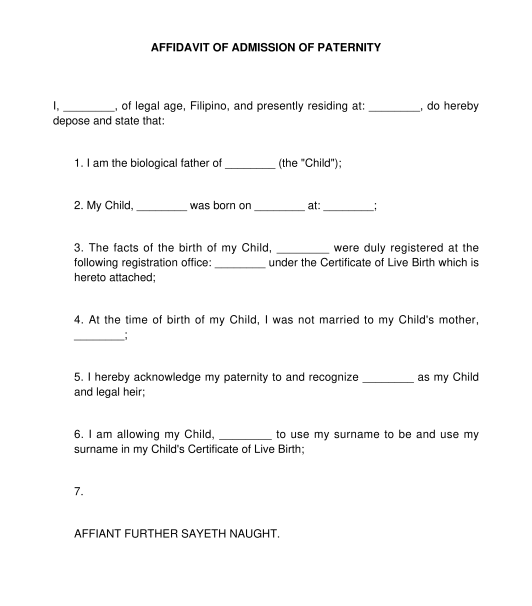 11/18/2025
11/18/2025

Answer a few questions and your document is created automatically.

Your document is ready! You will receive it in Word and PDF formats. You will be able to modify it.

 11/18/2025
11/18/2025
 Word and PDF
Word and PDF
 1 page
1 page
An Affidavit of Admission of Paternity is a document wherein the person signing the affidavit (the affiant) acknowledges or admits that he is the biological father of an illegitimate child. An illegitimate child is a child whose parents are not legally married to each other.
Note that the biological mother has no participation in this document as this affidavit can only be executed and signed by the biological father of the illegitimate child.
Under Philippine laws, acknowledging an illegitimate child allows the child to use the surname of the biological father, to be entitled to support, and to inherit from the estate of the biological father upon the biological father's death.
While both documents are similar because they can produce the effect where the illegitimate child can use the surname of his biological father, both differ in the following manner:
An Affidavit of Admission of Paternity and an Affidavit of Legitimation differ in the following manner:
If the biological father of an illegitimate child wants to acknowledge said child, then it is mandatory to execute or sign the affidavit. This will ensure that the child will be allowed to use the surname of the biological father, to be entitled to support, and to inherit from the estate of the biological father upon the biological father's death.
The person who will sign the affidavit is the affiant who must be of legal age, and he will admit that he is the biological father of the illegitimate child.
The Affidavit of Admission of Paternity can be used as proof to establish the paternity of a biological father over a child. This may be used during the lifetime of the biological father and can also be used by the illegitimate child after his biological father's death.
Once the affidavit has been completed, the affiant must print at least 2 copies of the document, and then proceed with its notarization.
The affiant must personally appear before a notary public and present at least one current identification document (I.D.) issued by an official agency bearing the photograph and signature of the Affiant. The affiant must swear under oath the whole truth of the contents of the affidavit and then sign all copies of the affidavit. The affiant will be asked to leave one original copy for the files of the notary public.
Once notarized, the affiant may use the document as needed, i.e. admission that he is the biological father of the illegitimate child so that the illegitimate child will be allowed to use the surname of the biological father, to be entitled to support, and to inherit from the estate of the biological father upon the biological father's death.
The document where the details of the live birth of the illegitimate child is recorded which is usually the birth certificate, should be attached.
Yes, because an Affidavit of Admission of Paternity is a sworn statement to the effect that the affiant is the biological father of the illegitimate child, which should be executed or signed in the presence of a notary public. If not notarized, the Affidavit of Admission of Paternity isn't valid.
The affidavit should be registered or submitted to the local civil registry of the place where the biological father resides, to process the change of the illegitimate child's surname into the biological father's surname. In case there will be no change of surname on the part of the illegitimate child, then no registration is required.
Notarization fees for an Affidavit of Admission of Paternity are typically PHP100 to PHP500. The government agency concerned may also require the payment of registration fees.
The affidavit should contain the following information:
The Family Code of the Philippines is the primary law that governs marriage and family relations in the Philippines. On the other hand, affidavits are governed by the 2004 Rules on Notarial Practice. It should be noted that making false statements in an affidavit may be punishable under the Revised Penal Code.
You fill out a form. The document is created before your eyes as you respond to the questions.
At the end, you receive it in Word and PDF formats. You can modify it and reuse it.
Guides to help you
Affidavit of Admission of Paternity - sample template
Country: Philippines